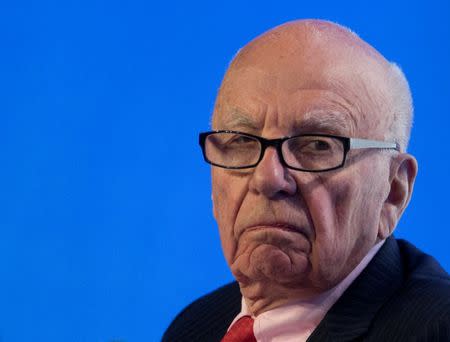Shareholders take aim at Murdochs with Fox voting rights push
By Ross Kerber
NEW YORK (Reuters) - A shareholder proposal calling for Twenty-First Century Fox Inc to do away with its dual-class share structure may inflict a symbolic black eye on the media company's founder Rupert Murdoch and his family at its annual meeting on Wednesday.
Strong fund manager support for the measure, which is advisory and would not force the company to change anything, would nevertheless signal investor dissatisfaction with the Murdoch family's grip on the company as filings show Fox has lost a longstanding shareholder ally in Saudi Arabia's Kingdom Holding.
At the same time, its Fox News division is recovering from a series of costly sexual harassment settlements, an issue that has slowed Britain's regulatory review of the company's bid to take over broadcaster Sky Plc.
To add to the turmoil, Fox has recently talked to Walt Disney Co about selling much of itself, according to a CNBC report.
The proposed new voting structure is aimed at beefing up investor oversight over Murdoch and his sons Lachlan and James, who are all Fox board members. The proposal has the support of influential proxy advisory firm Institutional Shareholder Services but is opposed by Fox.
The shareholder meeting is scheduled for 10 a.m. (1800 GMT) on Wednesday in Los Angeles.
The majority of Fox shares traded publicly are class A shares, which have no voting rights. The Murdoch family owns about 39 percent of the class B voting shares, according to the company's proxy.
Major mutual fund firms have been pushing the importance of equal voting rights as a way to improve the way companies are run, a shift that may give the reform proposal at Fox a boost, according to corporate governance experts.
"I would expect the large institutions would support it," said Charles Elson, a professor at the University of Delaware who follows corporate governance, of the shareholder resolution.
A Fox spokesman referred to the board's opposition statement in its proxy which says the current voting structure helps focus on long-term business strategy and helps attract and retain employees. It also says the board is sufficiently independent.
Mario Gabelli, a top 25 holder of Fox voting shares, feigned snoring at the Reuters Global Investment Summit on Wednesday in New York when asked if he expected the reform to pass.
"The guy (Rupert Murdoch) has 40 percent of the vote and the ISSs of the world are going to do absolutely nothing," said Gabelli.
TOO MUCH POWER
A similar proposal calling for a single share class came close to getting a majority in 2015 at Fox’s sister company News Corp.
Fund executives worry technology initial public offerings like that of Snap Inc, which offered outside investors no voting rights, concentrate too much power in the hands of insiders.
Among big fund shareholders of Fox, representatives of BlackRock Inc, State Street Corp and T. Rowe Price Group Inc declined to comment on how they planned to vote at Fox. Each backed a similar measure at News Corp in 2016, according to researcher Proxy Insight. Each has expressed concerns about voting rights in general.
The Murdoch family will not be able to count on a traditional ally in the vote, Saudi Arabia's Kingdom Holding Co, listed as having 6.6 percent of the Class B shares in a 2015 proxy, but not listed as a major shareholder in the current proxy.
The company said in a 2016 press release that its previous chief executive, billionaire Prince Alwaleed Bin Talal, had a "strategic alliance" with Rupert Murdoch. But the prince is among dozens of top Saudis detained recently by the country's Crown Prince Mohammed bin Salman. Kingdom Holding did not respond to e-mailed questions this week.
Elson and others cautioned that even if the advisory measure received a majority of shares voted it might not lead to a restructuring, a sign of Murdoch's control.
Laura Campos, a director at the Nathan Cummings Foundation, which sponsored the motion for revamped voting rights, said even though the measure is advisory, it would pressure Fox leaders if it won a majority.
"Scandals tend to make investors more supportive of proposals asking for improved corporate governance," Campos said.
(Reporting by Ross Kerber; Editing by Anna Driver and Bill Rigby)




